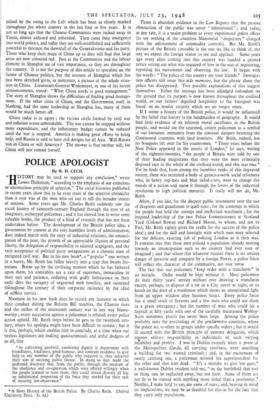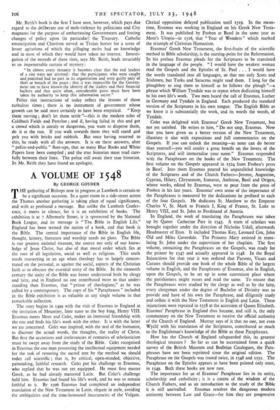POLICE APOLOGIST
By R. H. CECIL
"HISTORY may be used to support any conclusion," wrote Lowes Dickinson, "according to the emphasis of our conscious or unconscious principle of selection." The social histories published
in recent years show this to be even truer of the selective chronicler than it ever was of the men who set out to tell the broader stories of nations. Some years ago Mr. Charles Reith suddenly saw the social history of nineteeth-century England through the eyes of an imaginary, archetypal policeman ; and it has moved him to write some valuable books, the product of a kind of research that has not been undertaken before. The development of the British police idea, a government by consent at the very humblest levels of administration, does indeed march with the story of industrial relations, the emanci- pation of the poor, the growth of an appreciable illusion of personal liberty, the delegation of responsibility to salaried scapegoats, and the tacit acceptance of political party antagonisms as a chronic state of mitigated civil war. But in his new book*, a " popular " one written in a hurry, Mr. Reich has fallen heavily into a trap that besets his- torians. Borne up by the civilising mission which he has fathered upon them, his constables are a race of supermen, immaculate in their tact and patience, enduring with godly forbearance in their early days the savagery of organised mob hostility, and sustained thioughout the century of their corporate existence by the ideal of selfless service.
Nowhere in his new book does he record any instance in which their conduct during the Reform Bill troubles, the Chartist riots and the strikes of the nineteenth century was in any way blame- worthy ; every accusation against a policeman is refuted, every police action upheld. Mr. Reith stops before he gets to the twentieth cen- tury, where his apologia might have been difficult to sustain ; but it is this, perhaps, which enables him to conclude, at a time when our tireless legislators are making quasi-criminals and artful dodgers of us all, that
" by cultivating goodwill, combining dignity in deportment with friendliness, kindliness, good-humour, and constant readiness to give help to any member of the public who required it,. they achieved their aim of securing public favour. In doing so they made the profound discovery that, from the public, through the medium of the obedience and co-operation which were offered willingly when the people learned to trust them, they could obtain directly all but an infinitesimal proportion of the force they needed for their task of securing law-observance."
*A Short History of the British Police. By Charles Reith. (Oxford University Press. 3s. 6d.) There is abundant evidence in the Law Reports that the passive obstruction of the public was never " infinitesimal " ; and today, at any rate, it is a major problem to every experienced police officer (to say nothing of the countless Ministerial " inspectors " charged with the enforcement of commodity controls). But Mr. Reith's picture of the British constable is the one we like to think of, the one we expect the foreign visitor to see and applaud. Some years ago every alien coming into this country was handed a printed notice setting out what was required of him in the way of registering, reporting his movements and observing the law. It began with the words : " The police of this country are your friends." Immigra- tion officers still issue this aide memoire, but the phrase about the police has disappeared. Two possible explanations of this suggest themselves. Either the message has been adjudged redundant on the ground that its purport is now known throughout the civilised world, or our fathers' dignified hospitality to the foreigner was based on an insular security which we no longer enjoy.
If I wrote a history of the British police, it would be influenced by the belief that history is the handmaiden of geography. It would find little evidence of an inherent moral excellence in the British people, and would see the unarmed, citizen policeman as a symbol of our fortunate immunity from the constant dangers besetting the Continental countries with land frontiers. Mr. Reith, indeed, has no bouquets left over for his countrymen. "Three years before the New Police appeared in the streets of London," he says, writing of the eighteen-twenties, " the people of Britain were told by one of their leading magistrates that they were the most criminally disposed race in the whole of the civilised world, and this was true." Yet he finds that from among the humblest ranks of this depraved society, there was recruited a body of guinea-a-week social reformers who, in heavy top-hats and blue tailed-coats, were to change the morals of a nation and nurse it through the fevers of the industrial revolution to high political maturity. It really will not do, Mr. Reith.
Allow, if you like, for the deepest public resentment over the use of dragoons and guardsmen to quell riots ; for the contempt in which the people had held the corrupt and ineffectual watchmen ; for the inspired leadership of the two Police Commissioners at Scotland Yard (Colonel Rowan and Richard Mayne, to whom, and not to Peel, Mr. Reith rightly gives the credit for the success of the police idea) ; and for the skill and foresight with which men were selected for the delicate, exacting job of policing London as it then was. It remains true that those men policed a population already moving .towards an emancipation such as no country had ever seen or imagined ; and that where (for whatever reason) there is no serious danger of invasion and conquest by a foreign Power, a police force will reflect the character of the community, not vice versa The fact that our policemen " keep order with a truncheon " is no miracle. Order would be kept without it. Most policemen do their thirty years' service without ever drawing a truncheon except, perhaps, to dispose of a rat in a City street at night, or to knock on the door of a warehouse which shows an unexplained light from an upper window after business hours. Every police force has a small stock of firearms and a few men who could use them in a grave emergency ; but the number of men who could hit a hayrick at fifty yards with one of the carefully maintained Webley- Scott automatic pistols has never been large. Arming the police probably suits the psychology of the gendarmerie countries, where the police act so often in groups under specific orders ; but it would ill accord with the British principle of extreme delegation, which reposes solitary responsibility in individuals of such varying reliability and probity. I was in Dublin recently when a posse of the Metropolitan Garda, all carrying revolvers, were searching a building for two wanted criminals ; and, in the excitement of nearly catching one, a policeman mistook his superintendent for the other and shot him dead. " It's a mistake to give 'em guns," a well-known Dublin resident told me, " on the battlefield that sort or thing can be explained away, but not here. Some of them are not fit to be trusted with anything more lethal than a peashooter." Neither, .I make bold to say, are some of ours ; and, bearing in mind its implications, we may be as thankful for this as for the fact that. they carry only truncheons. Mr. Reith's book is the first I have seen, however, which pays due regard to the deliberate use of mob-violence by politicians and City
magnates for the purpose of embarrassing Governments and forcing changes of policy upon (in particular) the Treasury. Catholic emancipation and Chartism served as Trojan horses for a score of lesser agitations of which the pillaging mobs had no knowledge and in most of which they would have taken no interest. Investi- gation of the records of these riots, says Mr. Reith, leads invariably to an impenetrable curtain of mystery :
" In almost every instance it becomes clear that the real leaders of a riot were not arrested: that the participants who were caught and punished had no part in its organisation and were guilty only of theft or breach of the peace ; that it was impossible for the Govern- ment not to have known the identity of the leaders and their financial backers and that quite often, considerable pains must have been taken by authority to keep this information secret."
Police riot instructions of today reflect the lessons of those turbulent times ; there is no instrument of government whose growth can be said more certainly to have been empirical. " Keep them moving ; don't let them settle "—this is the modern echo of Coldbath Fields and Peterloo ; and if, having failed in this and got a crowd which is unruly or dangerous, you want to disperse them, do it at the run. If you walk towards them they will stand and pelt you with bricks and rubbish. But once having resorted to this, be ready with all the answers. It is on these answers, after " police-and-public " flare-ups, that so many Blue Books and White Papers have been compiled ; and the true historian must read care- fully between their lines. The police still await their true historian.
In Mr. Reith they have found an apologist.



































 Previous page
Previous page